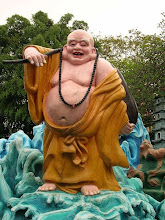 |
| Paramhansa Yogananda & his disciple Kriyananda |
In fact, I found that in his (Paramhansa Yogananda) later years he spoke of truth in all its vastness and subtelety, and much more impersonally than had been in his earlier years. Those disciples who had come to him many years before were not prepared for this new, and more impersonally wise, divine master.
The fact is, his early years were spent in trying to reach a large audience, and to uplift them with general spiritual teachings. In his last years, he turned from mass upliftment to training individual disciples in the higher teachings of the spiritual path. In his earlier years, he had presented himself in such a way as to give people the impression that what he had accomplished, they could accomplish easily. He belittled himself, in order to make it easier for others to identify with him. During his last years, however, he challenged his disciples to meet him on his own actual, exalted level in infinity.
Disciples who had been with him for many years tended to treat "youngsters" like me with a certain condescension, saying, "You weren't close to him, for many years, as we were." What they didn't realize was the physical closeness to the Guru could also draw a bandage over the eyes, blinding the person to his inner greatness. Therefore the great master Sri Ramakrishna said, "One who is enlightened is like an oil lamp which casts its rays at a distance, but creates a shadow directly underneath it."
Since the true Guru is not that which appears outwardly, but his inner overreaching spirit, it can easily, and often does, happen that those who come to him early in his life actually develop less of an awareness of who he truly is than those who come nearer the end. Ramakrishna's closest disciples were those who came towards the end of his life.
A master often has his own mission to fulfill before he can assume the role of training disciples. Therefore, again (as i said), those who came to him early may see him more naturally in terms of that outer role. In our Guru's case, he did train certain disciples from the beginning, but he showed himself to them much more from a level of human personality.
One difference I noted in him between when he was with us and when he was with the public was that, when he was with his disciples, he spoke more about Attunement with the Guru than even about personal spiritual practices like Kriya Yoga. In the first chapter of the Gospel of St.John it is stated, "As many has received him, to them he gave power to become the sons of God." By "received him" much more was meant than mere belief in Jesus Christ. "Received Him" meant deep inner attunement with t he Saviour's conciousness.
It is not possible for the ego to rise out of ego-conciousness by self-effort alone. Every struggle to do so only twists around to affirm that lesser conciousness yet again. Only by Attunement with a True Guru, who has himself transcended ego altogether, can one understand what it means to see things no longer with a personal bias. Without a Guru, it is impossible for techniques by themselves to raise one out of this final, and most fundamental, delusion; that we are each a separate reality, distinct and separate from all others.
Indeed, yoga techniques alone cannot ensure that anyone finds God. As the Master said of Jean Haupt, a male disciple who had practiced endless kriyas, but than had left the path, "He was like a merchant: I've done so many kriyas. Now, Lord, you must give me so much realization." The spiritual path is not like that. One cannot buy God!".
I understand now, that every kriya should be an act of devotional self-offering. For everything comes, in the end, by God's grace. Grace is like sunlight on side of the building. If the curtain of one room is kept closed, grace will not be able to enter there. Human effort is necessary, but that effort must be in cooperation with God's will. Such effort is indeed necessary, as a means of removing any and every ego-created obstacle to the sunlight of God's grace. Beyond that point, however, self-effort will only strengten the ego. This is where yoga comes in, but it must be performed with the attitude of aligning ones' egoic will with that God's will; it must not strenglten the ego. Grace flows most powerfully in the inner presence of, and even more importantly through inner Attunement with, one's Guru. As the sciptures of India state, "One moment in the company of a (true) Saint will be your raft over the ocean of delusion."
The master told us the story of Draupadi, wife of Arjuna. Krishna once said to her, "Why don't you practice the yoga techniques?"
"I would like to, Master," she replied, "but how can i, when i am unable to take my mind away from you long enough to practice them?"
"Krishna then," Yogananda told us, "only smiled".




















No comments:
Post a Comment